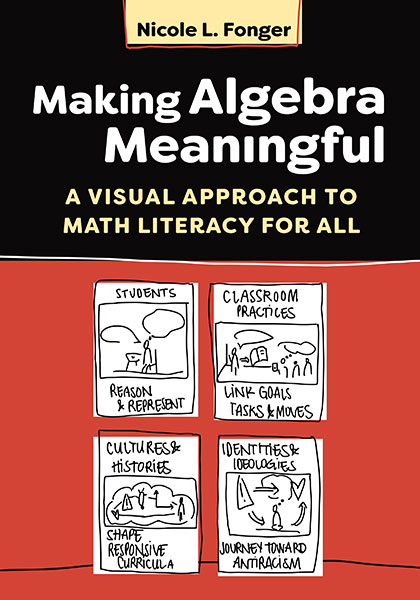Professors: Request an Exam Copy
Print copies available for US orders only. For orders outside the US, see our international distributors.
Publication Date: August 23, 2024
Pages: 192

Learn how to design algebra lessons that are responsive to all students’ experiences.
An essential understanding of the uses and practices of algebra remain out of reach for many students. In this book, award-winning researcher Dr. Nicole Fonger addresses the issue of how to support all learners to experience algebra as meaningful.
In a highly visual approach, the book details four research-based lenses with examples from 9th-grade algebra classrooms: (1) students’ algebraic reasoning and representing; (2) goal-directed classroom practices with technology; (3) culturally and historically responsive algebra literacy; and (4) teachers’ journeys toward antiracism. The author makes connections among research in algebra education; teaching algebra; and leading ambitious, equitable, and antiracist visions for algebra education.
By the end of this book, you will:
Nicole L. Fonger is an associate professor of mathematics and mathematics education at Syracuse University, and recipient of the Linking Research and Practice Award from the National Council of Teachers of Mathematics.
“ Making Algebra Meaningful is a thoughtful, impeccably researched, and inspiring work…. An excellent resource for aspiring and practicing teachers as well as teacher educators and leaders. Highly recommended”
—CHOICE Reviews
“Making Algebra Meaningful uses sketchnotes to share a vision of teaching that invites students to be curious, ask questions, and interrogate mathematical and social ideas. This book humanizes algebra as something that all people can do, and Fonger shows us how to support students’ identities as powerful, competent learners of mathematics.”
—Amy Ellis, professor of mathematics education, UGA Mary Frances Early College of Education, University of Georgia
“In Making Algebra Meaningful, Nicole Fonger takes the reader on a journey to understand algebra learning from a variety of perspectives. Throughout the book, she effectively incorporates the metaphor of a lens, and the process of zooming in and out, to support readers with seeing mathematics teaching and learning differently. The author also affords readers opportunities to make connections through multiple representations, as the text is accompanied by the author's sketchnotes throughout the book. Readers are invited to sketchnote while reading to develop their ideas further.”
—Amanda Jansen, professor, School of Education, University of Delaware
Contents
Acknowledgments xi
1. What Counts as Meaningful Algebra Learning 1
The Importance of Algebra 1
Big Question 2
My “Why?” 3
What’s My Angle? No Angle, but Many Frameworks or Lenses 3
Structure of the Book 6
2. Learn to Sketch, Sketch to Learn 15
Why Should I Sketchnote? 15
Sketchnoting 101 21
Deepening Your Sketchnoting Practice 25
Math Ed Sketchnotes 29
3. Algebra Is Something You Do 32
Mainstream Approaches to Doing Algebra 33
Responsive Approaches to Doing Algebra 36
Big Ideas of Algebra as a Course of Study 44
A Recap—What Is Algebra? 49
4. Zoom Setting 1: A Focus on Students’ Reasoning and Representing in Learning Algebra 51
Learning to “See” Students’ Representational Fluency 53
Representational Fluency in Equivalence and Equation Solving 58
Learning to “See” Students’ Quantitative Reasoning 62
“Seeing” Students’ Functional Thinking 66
5. Zoom Setting 2: Supporting Students’ Meaningful Algebra Learning Over Time in Classrooms 71
Supporting Meaningful Equation Solving 72
Visual Story 1: Supporting Students’ Representational Fluency in Determining Equivalent Expressions With Technology 73
Visual Story 2: Supporting a Functions Approach to Equation Solving 82
Visual Story 3: Supporting the Core Concept of Equations as Equivalence Relations 85
Reflecting on Frameworks of Instructional Supports for Meaningful Learning 90
6. Zoom Setting 3: People, Place, and Algebra as a Tool for Critical Literacy 96
What Is Historically Responsive Literacy? 97
Visual Story 1: Historically Responsive Literacy Begins With Relationships and Identities 99
Visual Story 2: Thinking Like City Planners (Intellect) and Modeling Trends (Skills) 104
Visual Story 3: Criticality and Emotion 107
Practical Path Forward: People, Place, and Algebra as a Tool for Critical Literacy 108
7. Journeying Toward Antiracism in Algebra 112
Disproportionality in Algebra for All: An Opportunity Gap 113
Journeying to See Racist Structures (Antiracism 101) 115
Practical Path Forward 118
8. Tools and Practices for Advancing Algebra Education Together 122
Theme 1: Co-Visioning Meaningful Algebra Learning and Teaching 125
Theme 2: Building Effective Communication 126
Theme 3: Centering the Context, Place, and People of Where You Seek to Understand and Change Students’ Opportunities to Learn Meaningful Algebra 128
Theme 4: Co-Creating Knowledge in Community-Engaged Scholarship 129
Centering Equity (An Epilogue) 133
References 139
Appendix A. Chapter 2: Additional Sketchnoting Resources 147
Appendix B. Chapter 4: Additional Research 149
Appendix C. Chapter 5: Additional Activity Design Notes 151
Appendix D. Chapter 6: Research and Resources on Historically Responsive Literacy in Math 153
Appendix E. Chapter 7: Toward Antiracism 159
Index 169
About the Author 173
Professors: Request an Exam Copy
Print copies available for US orders only. For orders outside the US, see our international distributors.